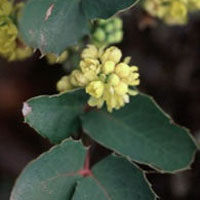Gluten Free
What does following a gluten-free diet mean? That you're embarking on an easy diet with a wide range of health-promoting effects. Instead of dwelling on what you’re giving up, consider that you’re going to enjoy a whole new world of delicious food options to meet your special dietary needs. You’ll be eating seasonally, choosing more fresh fruits and vegetables, focusing on meats, seafood, poultry, legumes, lentils, corn, and rice, and discovering fascinating ancient grains such as quinoa, amaranth, and millet. You’ll be able to eat potatoes, eggs, most cheeses, even chocolate (!)—and enjoy them without guilt because you’ll be taking good care of your body. In fact, you’ll probably end up eating—and feeling—better than ever!
Visit this page for more information about living Gluten Free
---
We carry a large variety of gluten free items, the brands listed below represent just some of the offerings we carry















More Diets
Oregon Grape
 © Steven Foster
© Steven FosterHow It Works
Alkaloids, including berberine, berbamine, canadine, and hydrastine, may account for the activity of Oregon grape. Isolated berberine has been shown to effectively treat diarrhea in patients infected with E. coli.2 One of the ways berberine may ease diarrhea is by slowing the transit time in the intestine.3 Berberine inhibits the ability of bacteria to attach to human cells, which helps prevent infections, particularly in the throat, intestines, and urinary tract.4 These actions, coupled with berberine’s ability to enhance immune cell function,5 make Oregon grape possibly useful for mild infections although clinical trials are lacking on the whole root.
In one clinical trial, an ointment of Oregon grape was found to be mildly effective for reducing skin irritation, inflammation and itching in people with mild to moderate psoriasis.6 Whole Oregon grape extracts were shown in one pharmacological study to reduce inflammation (often associated with psoriasis) and stimulate the white blood cells known as macrophages.7 In this study, isolated alkaloids from Oregon grape did not have these actions. This suggests that something besides alkaloids are important to the properties of Oregon grape responsible for reducing inflammation.
The bitter-tasting compounds as well as the alkaloids in Oregon grape root are thought to stimulate digestive function.
How to Use It
A tea can be prepared by boiling 1–3 teaspoons (5–15 grams) of chopped roots in 2 cups (500 ml) of water for fifteen minutes. After straining and cooling, 3 cups (750 ml) can be taken per day. Tincture, 1/2–3/4 teaspoon (3 ml) three times per day, can be used. Since berberine is not well absorbed, Oregon grape root might not provide adequate amounts of this compound to treat significant systemic infections. A physician should be consulted in the case of infection before attempting to use Oregon grape. An ointment made with 10% Oregon grape extract applied three or more times daily may be useful for psoriasis.
Copyright © 2025 TraceGains, Inc. All rights reserved.
Learn more about TraceGains, the company.
The information presented by TraceGains is for informational purposes only. It is based on scientific studies (human, animal, or in vitro), clinical experience, or traditional usage as cited in each article. The results reported may not necessarily occur in all individuals. Self-treatment is not recommended for life-threatening conditions that require medical treatment under a doctor's care. For many of the conditions discussed, treatment with prescription or over the counter medication is also available. Consult your doctor, practitioner, and/or pharmacist for any health problem and before using any supplements or before making any changes in prescribed medications. Information expires December 2025.











